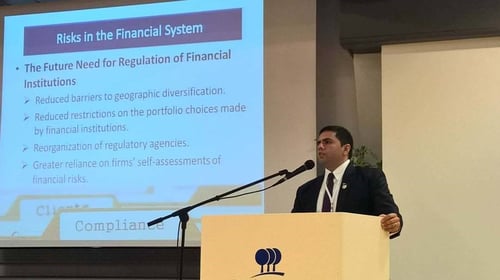Dr. Nawazish Mirza was invited as the keynote speaker for the 8th International Conference with the theme “Future World 2050” hosted by University of Pula, Croatia. This conference is indexed in Web of Science, and brings together various stakeholders including policy makers, professionals and academia to brainstorm on issues related to the current day business. The 2017 conference was aimed at discussing innovations and its impact on various business verticals for developed and emerging economies. Dr. Mirza’s key note speech explored challenges and opportunities for financial systems of the future amidst technological innovations.

Abstract:
A resilient and stable financial system is imperative for economic development and growth. In the recent years, the global financial system has experienced colossal changes. These are either triggered by volatile economic indicators like declining oil prices or by disruptive technological innovations. These changes have impacted economic systems in multiple ways. On one side, we see major policy transitions and evolution of new fiscal and regulatory regime like introduction of taxation in GCC, banking reform package in EU, demonetisation in India etc. On the flip side, technological disruption has warranted regulators to reshape financial architecture to adapt automation in financial services. As this economic and technological dynamism is likely to continue, the financial systems of the future will have some interesting perspectives with increasing contribution of developing economies in global savings, investments and capital stocks. While this may increase the challenges for financial intermediation, it will enhance the interdependence of developed and developing nations. In presence of proper governance policies, this cointegration will yield mutual dividends but in absence of robust discipline this interdependence may lead to systemic shocks, asset price bubbles and other economic fragilities that may hamper developing countries. Similarly, the technological innovations may enhance financial inclusion through digital outreach but the regulatory lapses in micro prudential governance of fintech can lead to new economic traps. Therefore, economic systems of the future must demonstrate flexibility in financial architecture to capitalise on innovation driven opportunities as well as show resilience towards new challenges.












